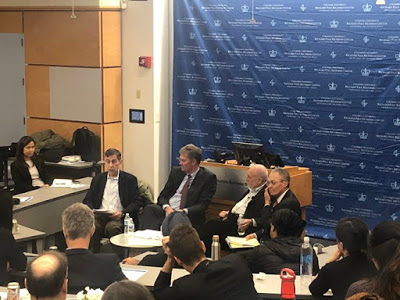I have been meaning for some time to write an appreciative note here concerning the late Edward Kleinbard’s outstanding new book – completed by him last year, just in time from a medical standpoint – What’s Luck Got To Do With It?
The book is an important contribution, laser-focused on a key aspect of America’s greatest current ills, involving the demise of anything approaching equal opportunity, as runaway high-end wealth inequality raises the ladders to be ever more distant from the ground floor.
Shock fact that the book mentions: the government does more to subsidize college education by children from rich families than poor or middle class ones (!). Only in America. This comes on top of the rich families’ spending ever more in comparative as well as absolute terms than those below them in the economic scale.
The book follows up on Ed’s previous book, We Are Better Than This: How Government Should Spend Our Money in pivoting from a primary tax focus to one of looking at the fiscal system as a whole, with emphasis on expanding opportunity by recognizing how superior peer countries’ fiscal policies typically are to ours, with their greater provision of healthcare, education, and other basics.
One key topic of emphasis in the new book is how the ideology that Ed called market triumphalism, and I have similarly labeled as “market meritocracy,” poisons the well by creating the false belief that both success and failure in one’s career and economic enterprises are wholly deserved. Even if we falsely believed that people had reasonably equal starting points, the new book adduces powerful evidence regarding the dominant role of luck in determining who succeeds or fails, even with unequal “ability” levels on top of seemingly equal starting points.
The book convincingly ties the false downplaying of luck’s role to underlying psychological factors. But – I suspect, out of diplomacy, because Ed was seeking to persuade, not alienate, American readers and especially those with potential policy influence – it does not place as much emphasis on how American ideology makes this an especially toxic line of thinking in our popular culture and politics. This is a topic that I address in my as yet unplaced book manuscript, Bonfires of the American Dream (a kind of follow-up to Literature and Inequality).
One especially interesting aspect of What’s Luck Got To Do With It? is its philosophical focus. At a USC Law School Zoom book talk yesterday – the video from which may soon be posted – this topic came up, especially in remarks by Ed’s USC colleague Gregory Keating. In general, Ed’s philosophical alignment in the new book has some common ground with that of “liberal egalitarianism,” as espoused most prominently by Ronald Dworkin. Yet it is to the “right” of Dworkin in one sense, and to the “left” in another sense. (I put the terms “right” and “left” in scare quotes to clarify that I do not mean to link this too closely to the debased state of current U.S. politics, on the increasingly fascist right especially.)
The book is seemingly to the “right” of Dworkin in positing that people should be deemed to have a right to retain the “brute luck” associated with innate ability differences as a matter of birth, and that only brute luck differences from differential environments are fair game for redistribution.
But it is both seemingly and actually to the “left” of Dworkin in positing that option luck differences – from the playout of deliberate choices that we make – should be on the redistributive table as well.
I would disagree with Ed on the first of these two points – considering differences in innate ability an aspect of brute luck that is fair game for redistributive attention – if I were convinced that he were asserting it as a foundational moral principle. But I think the book makes it clear that he is offering this as a concession to win wider acceptance. For example, it describes as “unfair” the fact that taller people have higher average earnings than shorter ones, although it disclaims any effort to address this disparity. The view appears to be that, even with innate ability differences taken off the table – a move that not only comports with some intuitions that we all have, but that may help to encourage people to view themselves as responsible to do the best they can – there is still plenty of scope to make our society vastly more just than it currently is.
By contrast, the sense in which the book is to the “left” of Dworkin is critically important. Dworkin’s framework can be used, whether or not he would have done so himself, to justify radically unequal outcomes that reflect, for example, Jeff Bezos’ or Mark Zuckerberg’s having won winner-take-all contests with huge payoffs, in part because they were simply a bit luckier than their rival contestants. With luck being as important to people’s outcomes as the book shows that it is, meaningful egalitarianism of the scope that it had for Ed requires addressing ex post inequality (albeit, still with an eye to incentives) without allowing it to be ruled out of bounds simply because some won and others lost in competitive markets where they all deliberately played.
